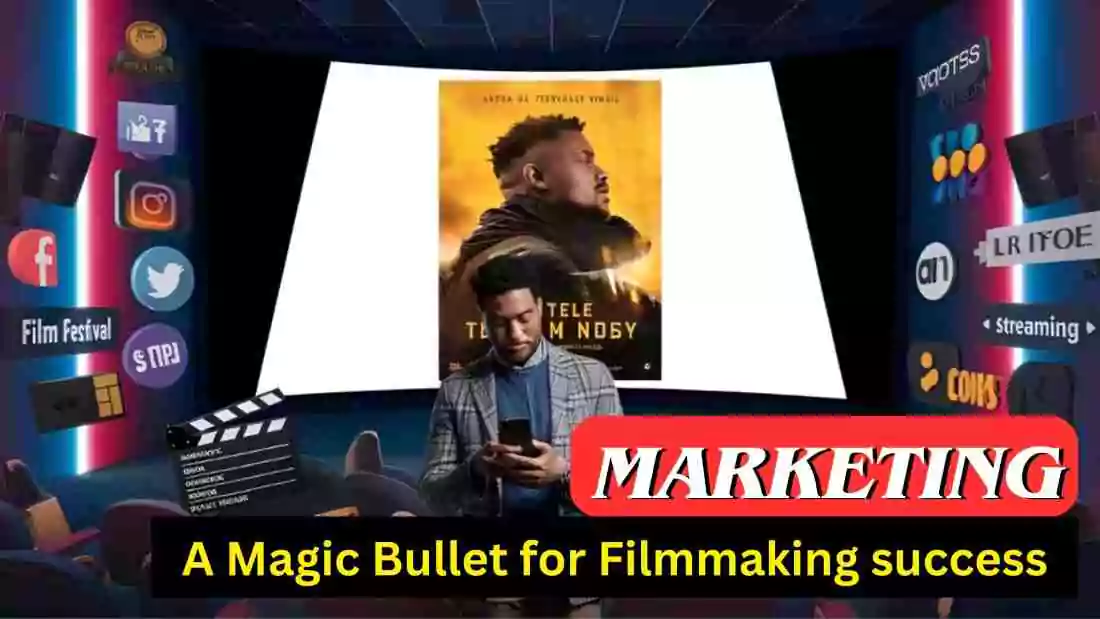
Let’s start with a story.
It is about an old friend of mine – John, a guy I love to call GFW (Guerrilla Film Warrior).’
In 2009, John reached out and announced he wanted to make a faith-based movie, but he had no money.
Yet, my pal was adamant he would shoot and the movie would be a “blockbuster.”
“Ol’ boy dreaming cost nothing.” I said to him.
I was skeptical, and so were many others,
But GFW was confident in his strategies. In fact he was willing to spend his house rent, which would be due in a few weeks, on the project!
And without hesitation, he went ahead with the production, borrowing even more to push through filming.
Well, because of his passion and determination, friends and associates rallied behind him.
The cast and crew were family, colleagues, friends, and members of his church.
It was a labor of love for all participants.
Most actors came on set with their costumes and homes of crew members were used as locations for filming.
In less than two weeks, the movie was in the can. But many aspects of the production screamed ‘low funding.’
While in the post, most agreed it was a good story, with good sound and picture quality, but the picture needed big “names” to draw attention.
And then distribution commenced.
Alas, the movie scored big with its primary audience – the church.
Despite its low budget and absence of a star cast, the target audience loved the story of faith, resilience, and redemption. The narrative struck a chord with many viewers.
The low budget story was a commercial success, and many of his church members went out of their way to show appreciation and support the film further.
The movie sold and accomplished more than many secular Nollywood projects during that period.
Everyone was surprised.
But how was GFW able pull it off?
Was there a secret production strategy no one knew about? Now, with the benefit of hindsight, it all seems so obvious.
The answers were in plain sight all along. All wrapped under the fabric of marketing. Twenty-twenty vision you might say.
So, in this article, we want to talk about film marketing.
A critical ingredient of filmmaking that can make or mar your film—call it a magic bullet, if you will.

READ ALSO: What Is Film Insurance and Do You Need It for Success?
READ ALSO: Trailers: The Ultimate Secret for Successful Film Marketing?
READ ALSO: Finding Your Path: Different Routes To Success in Filmmaking
But first, let us start by exploring the concept of marketing.
What is Marketing?
Marketing entails promoting, selling, and distributing a product or service. It involves market research, advertising, public relations, and customer engagement.
In filmmaking, marketing is not all about selling tickets. Rather, It is about building an audience and generating buzz. That is, getting your film to the right people at the right time.
Why is Marketing critical for filmmaking success?
Marketing is central to all successful commercial endeavors, including filmmaking. Without marketing, even the best films may struggle to find an audience.
Below are four important reasons why filmmakers like any entrepreneur must embrace marketing.
Awareness: Marketing creates awareness of your film among potential viewers.
Interest: Good marketing can spark interest in your film. It can make viewers curious to learn more.
Desire: Effective marketing can create a desire to watch your film. It must convince viewers that they need to see it.
Action: Marketing drives action, encouraging viewers to buy tickets or stream your film.
Sailing The Waters—Moving ahead With Your Project
The best marketing plan amounts to nothing if there is no product. However, successful marketing does not begin with the product.
It is a torchbearer that starts long before the product hits the market.
Before GFW shot his movie, he had started marketing it to his primary audience.
He began with a play performed for the congregation at different times. It received positive feedback.
At the same time, he would often use the opportunity to tell his audience that the movie version was coming.
Today, independent filmmakers can engage an audience in many ways before production starts.
Having fewer resources does not mean you cannot create a buzz around your film. Filmmakers are using social media to share the word about their upcoming projects.
I find this video by Producer/Director Jade Osiberu uploaded by Greoh Studios, a good example.

Marketing Activities During Pre-Production
The pre-production phase is a good time to start the marketing machine. Here are some strategies you may consider:
- Create a website and social media profiles: Start building an online presence early. Share updates, concept art, and cast announcements. Post other content to keep potential audiences informed and excited.
- Press Releases and Early Buzz: Announce your concept and casting. Highlight any unique aspects of the production that might interest the media.
- Build a Community: Use social media to create communities around your film. When your movie comes out, supporters can help expand your reach.
Marketing Activities During Production
The production phase is a goldmine for creating content you can use to attract and engage audiences.
Behind-the-scenes content: Share behind-the-scenes videos, photos, and stories that showcase the filmmaking process. They can create a personal connection with potential viewers.
Here is a behind the scene content from Filmmaker/Producer Anita Abada.
Teaser trailers and first looks: Release a short teaser or “first look” clip. It should give your audience a taste of what is coming. Use cliffhangers or intriguing visuals to keep them wanting more.
Engage press/bloggers: Give exclusive access to select media and bloggers to create buzz. Set up interviews with the cast and crew to provide more depth to the story behind the film.
Marketing Activities During Post-Production
“It is a wrap.”
This call by the director may be hearty for most cast and crew members.
But for a producer or director, the work continues. Post-production is another critical time to ramp up marketing efforts.
Official Trailers/Posters: Releasing the official trailer and poster can widen your audience.
Host test screenings. Many producers and directors fear critical feedback before the release.
The filmmaker may want to protect the content. But the audience is the final judge. Formal or informal private screenings can help gather feedback and generate word-of-mouth buzz.
Email Marketing and Newsletters: If possible, use email newsletters. They can keep your audience updated on release dates, behind-the-scenes tidbits, etc.
Leveraging Entertainment Press: The press is the hub of information for most sectors of society; film is no exception.
There are TV, Radio, Podcast programs, newspapers, magazines, and blogs that focus on filmmaking.
If you are in Africa, Wakacast is a great platform to spread the word about your movie.
You can share your audition notice on the platform or source cast and crew. And when your movie is ready, you can share the word through the website.
Press Releases: We also have platforms that syndicate press releases. They will share your announcement with media outlets across the globe.
Marketing Activities During Distribution
When it comes time to release the film, your marketing efforts should be at their peak.
A lot depends on each producer and the distribution plans. If you have a distributor, the responsibilities are shared.
Nonetheless, here are a few suggestions you may consider.
Release Dates and Platforms: Choose the best platform for release. It could be streaming, theaters, or VOD. Timing is crucial—consider holidays, festivals, and competitor releases.
Work with influencers and reviewers to promote your film. Use reviews, interviews, and watch parties.
Merchandising/Exclusive Offers: You can sell or give away items such as T-shirts, posters, or digital content. Doing so will keep the buzz going and create more revenue streams.

Back to John the GFW
In hindsight, I now understand why the movie was a success with so few resources. My friend leveraged the power of marketing beyond the fine print of a textbook.
There are three important lessons I learned from his strategy.
Nurture your audience
Before shooting his film, he performed snippets from the story on stage for his congregation. The feedback was positive at every church event. He nurtured the audience.
Beyond the fact that times have changed, the situation cannot be the same for every filmmaker then or now,
Nonetheless, we can still nurture our audience for whatever projects we may have at hand. One way of doing this is to create social media communities and attract the right audience.
Leverage your contacts
John made good use of his contacts. He sought support from friends and colleagues. However, succeeding in this regard depends on your social capital.
If you are helpful and supportive of others, you will experience the same.
Furthermore, John did not sacrifice production quality. Although it was a low-budget production, available funding went into ensuring optimal audio and video quality.
Accessibility/Distribution

Upon completion, John took the movie across branches of his church in Lagos before taking it to other states in the country.
He organized special screenings that brought in donations. The movie made its way to other churches aside from his denomination.
After captivating audiences on the ‘church circuit’ in Nigeria and Ghana for eighteen months, he decided on a .general public release.
In a nutshell, GWR found an audience, created a product that the audience wanted, and made it accessible.
And with the endorsement from the pulpit, many bought and contributed to the cause. He understood marketing game and leveraged it for success.
Conclusion
Since 2009, when GWR made is film, film marketing has undergone significant changes. However, the core principles remain the same.
It starts by engaging with the target market and understanding their passion or pain point. After which you create a product that addresses their needs.
And after creating your product, make it accessible or available.
Marketing is not an afterthought but a crucial aspect of film production.
It is the ultimate magic bullet you need for filmmaking success.
Thank you for reading. We hope you find it helpful.
Please share the article with your friends and peers to spread the knowledge.
PS
If you are a filmmaker (actor, crew member, producer, director, writer, etc.) looking for production jobs, Wakacast is the best place to start.
No more running around offline and online to find the latest production updates.
As a filmmaker, you can find productions jobs on the platform.
Share your audition announcements and casting calls on the platform.
Connect with thousands of actors in Nigeria and around Africa with zero cost.
As a producer, hire cast and crew with ease.
Let’s talk. Send a mail to: info@wakacast.com or call: +234 803-300-0277.





